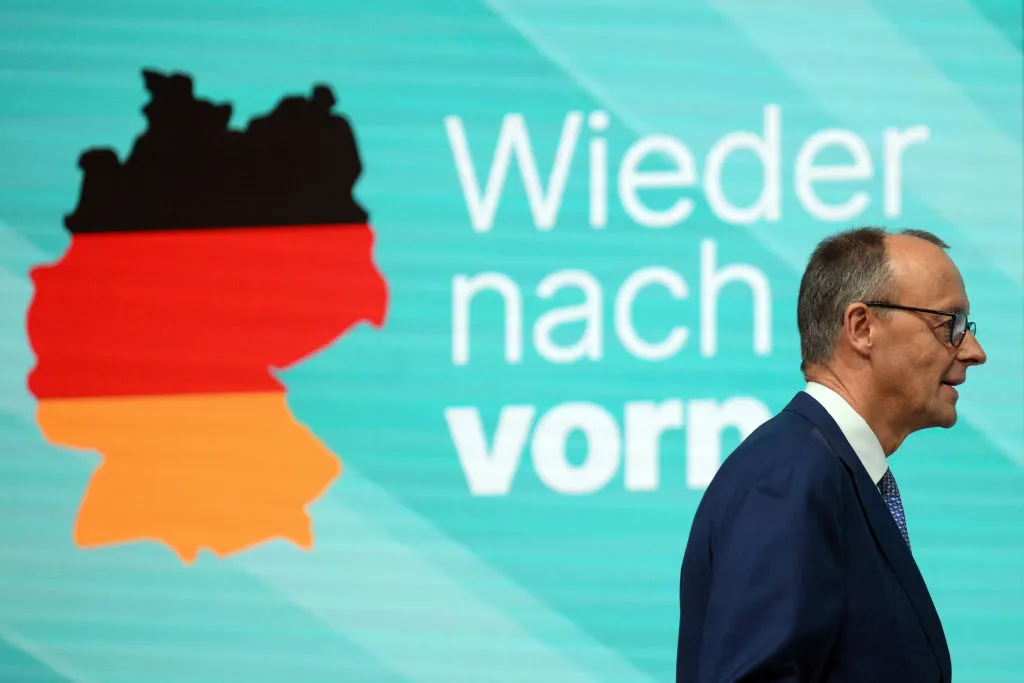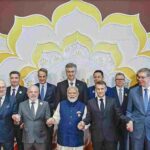
The risks of the German election on Sunday could not be greater.
The EU’s biggest economy has been in recession for two consecutive years, a dark perspective that should get worse if Donald Trump fulfills his threat of applying tariffs to Europe.
The “America First” agenda of the new White House occupant raised more questions about Germany’s security stance than at any other time since the end of the Cold War.
And a wave of terrorist attacks by migrants undermined public trust in the immigration system, giving an opening to the alternative to Germany (AFD). The German far right now seems ready to have its best electoral display in the postwar era, with AFD waiting behind the scenes and ready to attack the perceived flaws of the next government.
Final research before voting suggests that Friedrich Merz, leader of the Centro-Right Christian Democrats (CDU), will succeed the Olaf Scholz center-left Chancellor. He clearly faces significant challenges – some out of his control and some self -inflicted.
Take the problems of Merz’s immediate control first. The country’s economic model is in doubt, with the manufacturing shaken by the end of Russia’s cheap energy imports and China’s growing competitiveness in the world market. These problems will only deepen if the US president moves forward with his tariff threats. The automakers, the backbone of the economy, should be particularly affected as Germany exports more cars to the US than any other country.
Secondly, the prospect of US withdrawal from European security has stressed the need for Germany to do more, faster, in defense than it has done in the last 30 years. Three days after Ukraine’s large -scale Russian invasion on February 24, 2022, Scholz declared a Zeitenwende – promising a new era of German rearmament. But investment in the German army has been very slow in the three years since then. The readiness for combat actually fell because of the transfer of equipment to Ukraine.
As the US turns more and more inward, Germany will need to assume a central role in the defense of Europe. This will not only require money but also make difficult political decisions, such as the possible reintroduction of a form of recruitment. This is a challenge that Merz seems to understand. On Friday, he said Europe should “prepare for the possibility” that the US would not defend its European allies.
Finally, there is migration that research shows to be among the main issues for voters. The public is exhausted after a series of deadly stabbing and running over refugees and asylum applicants, more recently in Munich, just 10 days before voting. A feeling that the system is broken has boosted the increase in support for AFD, which openly embraces “remigration”, a term for mass deportations that originated between marginal white nationalists. Some of AFD’s far-right brothers, such as Marine Le Pen’s national rally in France, reject the German party for considering it very extremist because of its commitment to remigration.
But other problems were brought by Merz’s own actions. His hasty decision to accept AFD’s support to approve a resolution-first time to postwar Germany-made him seem reckless and a player.
The decision cost Merz confidence in potential center-left coalition partners just as quick negotiations to form a strong government are needed, Nils Schmid, social democratic deputy, told me, a possible CDU partner.
Merz’s play, though clumsy, was a recognition that rebuilding public trust around migration policy will be the key to the success of the next government. The resolution, approved with vows of AFD, promised performative hardness, which Merz admitted that it would be unenforceable. But imposing existing rules would be enough. Several recent attacks were committed by migrants whose asylum requests were rejected and were therefore subject to deportation.
The CDU leader also remains publicly compromised with the so -called “debt brake”, a constitutional ban on deficit spending in most circumstances. He was brought by Merz’s predecessor at CDU, Angela Merkel, to appeal to a prudent electorate, but seems painfully inappropriate in the face of Germany’s urgent need to invest in infrastructure and defense.
Fortunately for Merz, the unprecedented security situation can be used as a political coverage to abandon the debt brake at least for defense investment. Voters will give you a maneuver margin to move the rules of the deficit. Most will understand that politics as always is not enough to deal with the significant challenges of the country.
All major parties, including CDU, have ruled out working with AFD, so it will almost certainly be excluded from the government in this mandate. But if the next government hesitates, a strengthened AFD would argue that the Germans, having been failed by all major parties, should offer them a chance. Throughout Europe, from France to Austria, the sanitary cord that prevents cooperation with the far right is being broken. For now, he is staying in Germany, but can become impossible to support until the next election.
These are, then, the challenges that a chancellor Merz would face: succeed in one of the hardest hands given to a 30 -year chancellor or risk being remembered as the leader who paved the way for the first extreme right German government since 1945.
Originally published by the team on 02/22/2025
For Vok
Ido you are a Berlin reporter and editor. Previously, he was a senior journalist at the BBC and a European correspondent at New Statesman.
Source: https://www.ocafezinho.com/2025/02/23/por-que-a-alemanha-esta-numa-encruzilhada/

